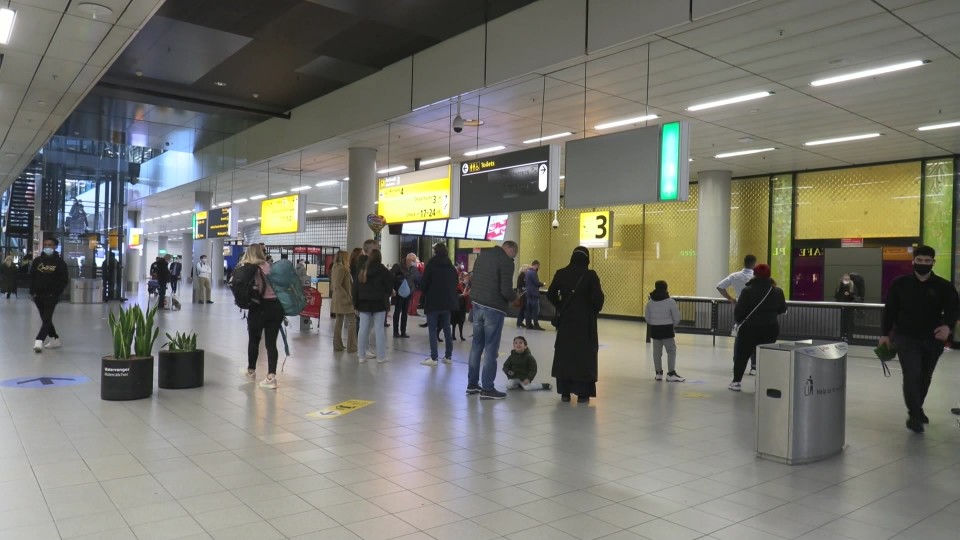
by Joris FIORITI with Jan HENNOP in The Hague
SCHIPHOL, Netherlands (AFP) — Dutch health authorities said Saturday the new Omicron strain of Covid-19 was “probably” among some of the 61 passengers who tested positive after arriving on two flights from South Africa.
The cases — more than one tenth of the 600 people on the two planes — were quarantined in a hotel near Amsterdam’s Schiphol Airport, one of Europe’s biggest international air travel hubs.
“The Omicron variant was probably found in a number of people who have been tested,” positive, the National Institute for Public Health (RIVM) said in a statement late Saturday.
Further analysis would be carried out to definitively establish whether the new variant was involved, it said, with the results to be made public Sunday.
Passengers said they had endured miserable hours at the arrivals hall to get tested. Many people failed to wear face masks or respect social distancing, they reported.
“We now know that 61 of the results were positive and 531 negative,” the Dutch Health Authority (GGD) said in a statement.
All passengers who tested positive must stay in hotel quarantine for seven days if they show symptoms and for five days if they do not, the GGD said.
Passengers who tested negative, but remain in the Netherlands, are expected to isolate at home. Those who do not live in the Netherlands can “continue their journey”, it said.
Passenger Paula Zimmerman who documented her night via videos posted on Twitter, said she finally received a negative result after hours of waiting but must now spend five days in home quarantine.
People on the plane were “taken from the tarmac to an isolated room where we waited for four hours before being tested”, Zimmerman told AFP.
“Everyone on the plane was in there” with little respect for social distancing rules, she said.
Her final video, posted around 0250 GMT on Saturday showed a row of more passengers waiting to be tested while others were slept on benches and on the floor.
“Organisation was terrible unfortunately. Lessons to be learned for future,” she tweeted.
‘Dystopia Central’
New York Times global health reporter Stephanie Nolen also tweeted her ordeal at what she called “Dystopia Central Airline Hallway”.
She described how passengers, including babies and toddlers, were crammed together waiting to get tested, while “still 30 percent of people are wearing no mask or only over mouth”.
Philippe, 33, who was on one of the flights from South Africa told AFP: “At a certain moment, you felt like you’re being taken prisoner.
“There was no direction, nobody knew what was going on. It was a super unsure situation and people got really angry about it.
“I am angry too,” he said. “Two years into the pandemic, why is it that authorities still have to think about how you test a planeload full of people arriving at Schiphol?”
The Dutch health authority said, “We understand that people are frustrated” by the situation at Schiphol overnight.
“People have just made a long trip with the idea that they will shortly be home,” it said.
“Instead just after landing, they are confronted with a situation we have never before experienced in the Netherlands, namely that people have to be tested at Schiphol and are forced to wait until they get a result.”
Dutch national carrier KLM said it would continue to operate flights from Johannesburg and Cape Town “in compliance with the stricter protocol”.
This meant that entry was banned to all passengers except for Dutch and EU residents, who must show a negative PCR test and self-quarantine on arrival.
“KLM is taking the situation very seriously and will continue to prioritise the safety of passengers and crew,” the airline said in a statement.
A KLM flight from Johannesburg landed around 1200 GMT, with 161 passengers on board. Another 107 passengers were not allowed to board in South Africa because they did not comply with the Dutch government’s new protocols, KLM spokesman Remco Rous said.
The checks in Johannesburg meant that travellers were able to enter the Netherlands without further delays, passengers told AFP.
© Agence France-Presse







